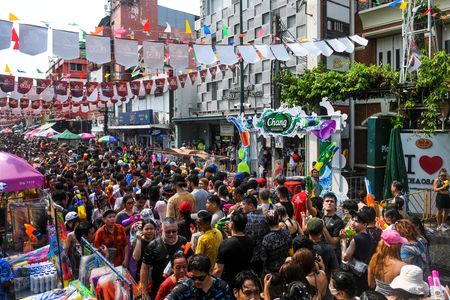 1
1 1
1
By Orathai Sriring and Kitiphong Thaichareon
BANGKOK (Reuters) – Thailand’s economy expanded faster than expected in the first quarter due to a recovery in tourism, data showed on Monday, while investors braced for political uncertainty after the opposition secured a stunning election victory on Sunday.
The tourism-reliant economy’s recovery has lagged its regional peers due to COVID-19, but gathered steam in recent months as Chinese visitors returned. The revival of the sector, which accounts for 11-12% of its gross domestic product (GDP), is expected to help offset the impact from declining exports.
Thailand’s state planning agency reiterated its outlook for a 2.7%-3.7% GDP growth in 2023, versus 2.6% last year, saying the post-election atmosphere should be kept positive to build investor confidence.
Southeast Asia’s second-largest economy grew 2.7% in the January-March period from a year earlier, versus a 1.4% growth in the previous quarter, data from the National Economic and Social Development Council (NESDC) showed.
On a quarterly basis, GDP rose a seasonally adjusted 1.9%, from a revised 1.1% contraction in the fourth quarter of 2022.
Economists in a Reuters poll had expected GDP to expand 2.3% year-on-year in January-March and 1.7% quarter-on-quarter.
The data, however, failed to lift the stock market that dropped as much as 1.3% in early trade due to concerns over political uncertainty and policy pledges after the election. The baht pared earlier gains.
Thailand’s political heavyweights were set for an intense round of deal-making on Monday after the election that delivered big gains for the opposition over parties allied to the military but with no clear indication of alliances taking shape.
“What needs to be done as quickly as possible is the formation of a stable government that will quickly continue policies that support businesses and the people,” said Chaichan Chareonsuk, chairman of the Thai National Shippers’ Council.
Several analysts echoed the view, saying investors were likely to stay on the sidelines as they wait for a new government and clarity on its policies.
“Until political clarity is attained, the private sector will wait and see before deciding to invest, especially with the concerns of pledges to raise the minimum wage,” said Kobsidthi Silpachai, head of capital markets research of Kasikornbank.
Meanwhile, the NESDC maintained its forecast for 2023 foreign tourist arrivals in Thailand at 28 million.
The country beat its tourism target in 2022 with 11.15 million visitors. Pre-pandemic 2019 saw a record of nearly 40 million foreign tourists, who spent 1.91 trillion baht ($56 billion).
The NESDC also kept its 2023 forecasts for goods exports to drop 1.6% and headline inflation to be between 2.5% and 3.5%.
($1 = 33.85 baht)
(Reporting by Orathai Sriring, Kitiphong Thaichareon and Satawasin Staporncharnchai; Editing by Himani Sarkar)